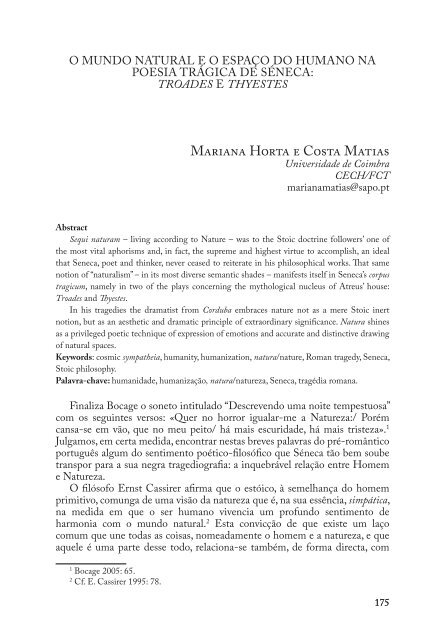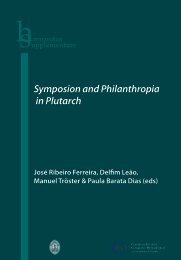Espaços e Paisagens. Vol. 1 - Universidade de Coimbra
Espaços e Paisagens. Vol. 1 - Universidade de Coimbra
Espaços e Paisagens. Vol. 1 - Universidade de Coimbra
You also want an ePaper? Increase the reach of your titles
YUMPU automatically turns print PDFs into web optimized ePapers that Google loves.
O MUNDO NATURAL E O ESPAçO DO HUMANO NA<br />
POESIA TRÁGICA DE SÉNECA:<br />
TROADES E THyESTES<br />
Mariana Horta e Costa Matias<br />
universida<strong>de</strong> <strong>de</strong> <strong>Coimbra</strong><br />
CECH/FCT<br />
marianamatias@sapo.pt<br />
Abstract<br />
Sequi naturam – living according to Nature – was to the Stoic doctrine followers’ one of<br />
the most vital aphorisms and, in fact, the supreme and highest virtue to accomplish, an i<strong>de</strong>al<br />
that Seneca, poet and thinker, never ceased to reiterate in his philosophical works. That same<br />
notion of “naturalism” – in its most diverse semantic sha<strong>de</strong>s – manifests itself in Seneca’s corpus<br />
tragicum, namely in two of the plays concerning the mythological nucleus of Atreus’ house:<br />
Troa<strong>de</strong>s and Thyestes.<br />
In his tragedies the dramatist from Corduba embraces nature not as a mere Stoic inert<br />
notion, but as an aesthetic and dramatic principle of extraordinary significance. Natura shines<br />
as a privileged poetic technique of expression of emotions and accurate and distinctive drawing<br />
of natural spaces.<br />
Keywords: cosmic sympatheia, humanity, humanization, natura/nature, Roman tragedy, Seneca,<br />
Stoic philosophy.<br />
Palavra-chave: humanida<strong>de</strong>, humanização, natura/natureza, Seneca, tragédia romana.<br />
Finaliza Bocage o soneto intitulado “Descrevendo uma noite tempestuosa”<br />
com os seguintes versos: «Quer no horror igualar-me a Natureza:/ Porém<br />
cansa-se em vão, que no meu peito/ há mais escurida<strong>de</strong>, há mais tristeza». 1<br />
Julgamos, em certa medida, encontrar nestas breves palavras do pré-romântico<br />
português algum do sentimento poético-filosófico que Séneca tão bem soube<br />
transpor para a sua negra tragediografia: a inquebrável relação entre Homem<br />
e Natureza.<br />
O filósofo Ernst Cassirer afirma que o estóico, à semelhança do homem<br />
primitivo, comunga <strong>de</strong> uma visão da natureza que é, na sua essência, simpática,<br />
na medida em que o ser humano vivencia um profundo sentimento <strong>de</strong><br />
harmonia com o mundo natural. 2 Esta convicção <strong>de</strong> que existe um laço<br />
comum que une todas as coisas, nomeadamente o homem e a natureza, e que<br />
aquele é uma parte <strong>de</strong>sse todo, relaciona-se também, <strong>de</strong> forma directa, com<br />
1 Bocage 2005: 65.<br />
2 Cf. E. Cassirer 1995: 78.<br />
175

















